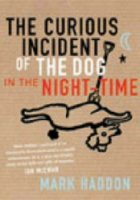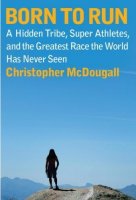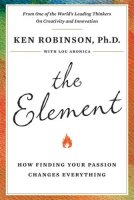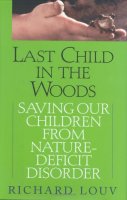 The Curious Incident of the Dog in the Night-Time by Mark Haddon (Jonathan Cape, 2003)
The Curious Incident of the Dog in the Night-Time by Mark Haddon (Jonathan Cape, 2003)
As with Born to Run, I picked up this book because it was lying around and the title caught my eye. I don't recommend it, but that doesn't mean I found it easy to put down. I had intended to take the book on the airplane with me, but finished before my boarding pass was printed. The story is initially compelling and the premise unique: a murder mystery through the eyes of a teen with Asperger Syndrome. Whether the portrayal of the way someone with Asperger Syndrome might think or act is realistic or not, I can't say. But it's an interesting viewpoint, and I loved the math problem at the end (though it was somewhat poorly worded) and the fact that the chapter numbers are all prime. (More)
 Born to Run, by Christopher McDougall (Knopf, New York, 2009)
Born to Run, by Christopher McDougall (Knopf, New York, 2009)
A book about running? Not my thing. On my daily walks (where by "daily" I mean five days a week and only when I'm not on the road) I've managed to work my way up to doing a quarter of my four miles at what could charitably be called a slow jog, but there my interest ended. However, my nephew received Born to Run for Christmas, and I was curious enough to flip quickly through it.
Born to Run is a fascinating and groundbreaking book. Actually, it's at least three books, interwoven, and it's no coincidence that when I perused it I couldn't decide if it was meant to be nonfiction or a novel. (More)The Franklin Insitute, Philadelphia, Pennsylvania
I don't remember my first visit to the Franklin Institute; I believe it must have been on some visit to Philadelphia when I was very young; all I remember was walking through the heart. Later, however, we moved to the Philadelphia area, and were regular visitors. For two summers I worked in the Franklin Institute Research Labs in the building next door, and even more important to me than my paycheck was the ID badge that allowed me to take the tunnel between the buildings and spend most of my lunch hours in the museum.
After he retired, my dad became a Franklin Institute volunteer, and it was natural for him to take his grandchildren there when they came to visit. By that time, the museum had grown an addition, with new exhibits that made it look like any modern science museum, but the kids' favorite, and my own, was the old building, with its greater educational content and more detailed, written information with each exhibit. Now Dad's grandchildren have children of their own, and on our recent visit to Philadelphia we all looked forward to watching them delight in our old favorites.
The great-grandkids were happy enough, but the rest of us were somewhat disappointed. To our delight, the heart is still there, as is the train that Dad used to drive as one of his docent duties (it's easier to keep a 350-ton locomotive than to get rid of one) but the "new building" style has now infected the old building, too. Many of our favorite exhibits are gone, replaced by displays designed for shorter attention spans and lesser literacy. The math room that had kept our kids entranced for hours was nowhere to be found, and when I finally asked a docent, "Excuse me, it's been a long time since I was here last, and I can't find the math room," he replied, "It has been a long time since you've visited; they took that out years ago."
It took a bit of effort, but we did find Newton's Dream, the kinetic sculpture that so entranced Heather as a child. It's in a different place now, and has been cut down in size, but that didn't stop the children from following it with the same fascination. Also riveting was Der Lauf der Dinge, a Swiss-made movie of a 30-minute Rube Goldberg setup with lots of pyrotechnics and impressive chemical reactions. Thanks to the magic of YouTube, you, too, can see this amazing performance, albeit broken into three segments. (Here are the links as well, since I note that embedded videos don't always show up in feedreaders: Part 1, Part 2, Part 3.
Lest I be seen as a totally hopeless conservative who never likes anything new, the museum's newest exhibit, Amazing Machine, is also excellent, and we could have spent much longer playing with its cams, gears, pulley, and linkages had we not been nearing the end of our visit. (Heather: That's what I want for Christmas. You can turn a mechanical engineer into a joyful homemaker, but the engineer is still there.)
The American Museum of Natural History, New York, New York
On my first visit to the American Museum of Natural History I was probably about as young as when I first encountered the Franklin Institute, but in this case nearly half a century elapsed between visits. The AMNA, however, shows more respect for its old exhibits, and the wonderful dioramas that are all I remember from my first visit are still featured, with all their high information content and long descriptions to read. I could easily have spent the entire day among them. Porter found one, the African buffalo, that was sponsored by George Eastman, and remarked, "He sponsored the Buffalo because there is no animal named Rochester, but he should have sponsored the Kodiak bear." Yes, we're still married; I happen to like that kind of humor.
The museum has several new exhibits as well as the old, most of which were quite good. There was a bit of a "politically correct" feel in a few places, but it was not unbearable, and in general the educational value and written descriptions were sufficient. Despite my primary concern for material to read, I am also particularly sensitive to the layout of displays—color, font, background, use and placement of images and other media—and this, too, the AMNH exhibits did well.
One disappointment was the Hall of Minerals, chiefly because whoever is responsible for lighting must have been on vacation. For several months. It was dark. At first I thought the gloom was meant to provide contrast to the brilliance of the minerals and gems, but many of the lights that should have been highlighting the rocks were also out. We very nearly missed the famous Star of India because it was in the dark.
In addition to the old favorites, we signed up for several special exhibits and shows. Traveling the Silk Road was disappointing, but only because I had expected the most from it. It was well done, but crowded, with not as much information as I had hoped and not enough time in the crowd to do justice to what was there. The best part was the section on silk making and sericulture.
I believe Journey to the Stars was a better-than-average planetarium show (more information, less mindless entertainment), but unfortunately I responded the way I always do when faced with a movie or movie-like substance in a dark room, awakening only at the end.
The Butterfly Conservatory was interesting, though I think I've seen more fluttering in the butterfly garden at our own Leu Gardens.
Frogs: A Chorus of Colors was great; Heather would have loved it. Except the part where we learned about the devastation being wrought by the chytrid fungus.
The American Museum of Natural History is well worth visiting more often than every 50 years. The dioramas alone are a homeschooler's paradise.Where Bd [Batrachochytrium dendrobatidis] thrives, generally in moist cool habitats, 50% of amphibian species and 80% of individuals can be expected to disappear within one year.... Currently it cannot be stopped in the wild and a minority of species seem able to survive with a Bd infection as larvae or as adults and these animals likely serve as a reservoir and vectors for future outbreaks. Notable among resistant species are worldwide invasive pest species including marine toads, American bullfrogs and African clawed frogs.

 Tales of the Greek Heroes by Roger Lancelyn Green (Puffin Books, London, 2002) and The Tale of Troy by Roger Lancelyn Green (Puffin Books, London, 1994)
Tales of the Greek Heroes by Roger Lancelyn Green (Puffin Books, London, 2002) and The Tale of Troy by Roger Lancelyn Green (Puffin Books, London, 1994)
These two books are meant to be read together, with the story of Troy second.
After my very positive experiences with Green's books on Robin Hood, King Arthur, and ancient Egyptian stories, I expected too much of these two. I still recommend them; they are worth reading, and I found that within a week something I read there helped me understand a story I heard later. Nonetheless, there are drawbacks. (More)RootsMagic, my favorite genealogy database program, has released RootsMagic Essentials, a version you can download that is absolutely free! In case anyone is wondering, I don't get a thing for this endorsement; I just like RootsMagic, and I like encouraging interest in genealogy. It looks as if one can do a lot with Essentials, and it might be a great, commitment-free way to keep track of family information even if one doesn't have (yet) a desire to delve any further. Sadly, one of my favorite features, color coding of families, is not part of the stripped-down version, but—tanstaafl—if there is, sometimes, a free lunch, the full-course dinner always costs.
If any of my family members decide to download RootsMagic Essentials, I'll be happy to send along a copy of my database. :) This actually seemed like a good idea at the grocery store.
This actually seemed like a good idea at the grocery store.
V-Fusion, by the same folks who brought you, "I could have had a V-8." (More)
Funny how things click together in this world.
I would never have heard of the award-winning Swiss movie, Vitus, had it not happened to be featured in an article in the Hartford Courant when our daughter's Swiss in-laws happened to be in Connecticut, and happened to look through the newspaper. (Why, O why does English not have a word for the "our child's in-laws" relationship? I have need of it often enough.) Knowing my interest in Swiss German, her father-in-law cut out the article and sent it to me. (I am going to have to invent my own term, I can see.)
That was months ago, and only recently did I have the sense to see if trusty Netflix could provide the movie. Much to my surprise, they could! We watched it this afternoon. Our intention had been to watch part during lunch and finish it during dinner, but we couldn't bring ourselves to turn it off.I've deliberately not included any links to Vitus, because they contain spoilers that I certainly would not have liked to have known about before seeing the film. But I do recommend it, as we thoroughly enjoyed it. It's PG, with a few words I wouldn't want the grandkids to pick up, but that would require reading the subtitles. I'd say they'd probably lose interest in a foreign-language film, but Swing Girls was a hit even though in Japanese.
Vitus combines some of my favorite themes: brilliant children, music, and loving families. Sure, I could complain about one or two things, but overall it was a delightful movie. Actually, the main disappointment was the language, which was falsely billed as Swiss German. I caught a few Swiss German words (and felt for the student being told by his teacher to speak High German only), but mostly I'd say I understood far too much of the German for it to have been anything other than High German throughout most of the film. I'd be interested in the verdict of those who know better, however. The characters freely mix English words and phrases in their speech, so maybe they are equally freely mixing the two Germans, and I'm only catching the few High German words and the much fewer Swiss German phrases I know. Or Swiss German words similar enough to High German that they sound familiar to my ear.
One question I had from the beginning was how they managed to get the actors to look so much as if they were really playing the piano—it looked far too good to be fakes. Here's the answer: Teo Gheorghiu, who plays the older Vitus.
How do we know this is really a Swiss film? The characters carry their cut flowers upside down!
 Tales of Ancient Egypt, by Roger Lancelyn Green (Puffin Books, 2004)
Tales of Ancient Egypt, by Roger Lancelyn Green (Puffin Books, 2004)
King Arthur was my introduction to Roger Lancelyn Green's books, and this inspired me to find more by the same author. Tales of Ancient Egypt did not disappoint. Egyptian gods, goddesses, stories, geography and history are rather muddled in my head, and this book is a great help in beginning to sort them all out. Like Green's Arthur stories, the tales are simultaneously appropriate and enjoyable for children and adults.
Two stories particularly interested me. One is the Egyptian take on the story of Helen of Troy. (Hint: The real Helen remained safely hidden in Egypt until Menelaus could reclaim her; it was a sort of spirt double that went to Troy with Paris and inspired all the Greek-Trojan bloodletting.)
The fascination of the second, entitled Se-Osiris and the Sealed Letter, lies in what it did to my understanding of the Biblical story of the Exodus. In The Sealed Letter, Egyptian magicians boast of their prowess with claims such as, "I could bring a great darkness over the land of Egypt that would last for three days," and "I...could bring a blight upon Egypt that would destroy its crops for one season." The Exodus story of Moses and the plagues always seemed unsatisfactory to me, first in the very strangeness of God using plagues of blood, locusts, darkness, etc. to motivate Pharaoh, and second that the Egyptian magicians would counter Moses's plagues with plagues of their own, rather than the much more logical (and useful) removal of the effects the plagues.
What this Egyptian tale shows me, however, is that God was speaking to the ancient Egyptians within the context of their own culture, in a language they understood.As an avid fan of mystery stories, I’m sure I would enjoy The Da Vinci Code, especially since I’m attracted to Robert Langdon by name alone. As a rational human being, however, I’m reluctant to open its pages. Not knowing any better, I’ve enjoyed such quasi-historical movies as Amadeus and Braveheart, learning only later how fast and loose the productions had played with the facts. Now it’s too late: the false images are burned into my consciousness, and it will be difficult, if not impossible, to replace them with the truth.
That’s the worst of historical fiction. At its best, it provides a wonderful gateway into the fascinating field of history itself, breathing life into the dry and confusing swirl of names, dates, and places that normally overwhelms us in school. But truth should never be sacrificed on the altar of art; if you want to tell the story your way, make up your own characters—don’t lie about real people and events. The Teaching Company, one of my favorite educational organizations whose products I highly recommend, produced two complimentary lectures on fact and fiction in The Da Vinci Code; because we were specifically given permission to pass them on to our friends, I’m posting links to them below. If TTC complains, I’ll take them down. They’re each about half an hour in length. (More)Google Fast Flip seemed like just another gimmick, but having given it a test drive I'm already hooked. Pick a newspaper, say the New York Times. Or a topic, such as Health. You're presented with an eye-catching snapshot of the beginning of the first article. You can see the headline, the first several paragraphs of text, and probably a graphic, pull-quote, or summary. Oh, and also some ads—but (shhh, don't tell Google) the ads are blessedly easy to ignore.
If you like what you see in the article, you can click on it to read the rest. Or you can hit your computer's arrow key and move quickly on to the next article. Did I say quickly? That's why I'm so excited about this. No point-and-click, no waiting for a page to load, just one keystroke and you're there. In a flash. It takes me about a second per article to determine whether or not I want to know more—usually not, it doesn't take much time to scan a lot.
This is far more satisfying than scanning news headlines in a feed reader. The headline itself does not usually give enough detail, and I find myself wasting too much time clicking on links that might have been interesting but are not. With Fast Flip I can take most stories with a single glance, while for many others I find that reading the first several paragraphs tells me what I want to know without having to bother to click through to the whole article. When I want more detail, it's there—but doesn't intrude unless I seek it out.
What will Google think of next? I hope this catches on in a big way; as yet there is not a great choice of sources. Chocolate Unwrapped: The Surprising Health Benefits of America's Favorite Passion, by Rowan Jacobsen (Invisible Cities Press, Montpelier, Vermont, 2003)
Chocolate Unwrapped: The Surprising Health Benefits of America's Favorite Passion, by Rowan Jacobsen (Invisible Cities Press, Montpelier, Vermont, 2003)
Like chocolate, this delicious book goes down easily, and the facts about chocolate's health benefits are not hard to swallow. At a mere 126 pages from introduction through references, it's a quick and easy read—I read most of it on the way to and from church today—and yet manages to cover the history and production of chocolate, a good deal of detail on why chocolate—which begins as a fruit, after all—should be considered a health food, environmental and labor issues in the production of chocolate, unusual chocolate recipes, and list of great chocolate sources. It is necessary to ignore a few insults to Columbus, the Puritans, and anyone who likes milk chocolate, but on the whole these are minor annoyances. (More)
 King Arthur and His Knights of the Round Table, by Roger Lancelyn Green (Puffin Books, 2008)
King Arthur and His Knights of the Round Table, by Roger Lancelyn Green (Puffin Books, 2008)
I bought this book for my grandson, who so enjoyed Roger Lancelyn Green's The Adventures of Robin Hood. His mother reported that the Robin Hood book was "perfect" for him, but I wish I had read it myself, first, so I could compare it with King Arthur, since I'm having second thoughts. King Arthur has been read by and to children for half a century, and there's nothing at all inappropriate about it, but there are not a few battles in which people's heads get lopped off, and a few babies conceived under less than ideal circumstances (Arthur in a scenario not unlike Solomon's), and—perhaps more disturbing for a child—a couple of examples of children raised by others instead of their own families. (More)
 The Element: How Finding Your Passion Changes Everything, by Ken Robinson (Viking, New York, 2009)
The Element: How Finding Your Passion Changes Everything, by Ken Robinson (Viking, New York, 2009)
I use the term the Element to describe the place where the things we love to do and the things we are good at come together. I believe it is essential that each of us find his or her Element, not simply because it will make us more fulfilled but because, as the world evolves, the very future of our communities and institutions will depend on it.
Robinson is convincing enough, and encouraging in his belief that it is never too late to find and nurture one's Element, but he is frustratingly short on practical advice. So many of the examples he gives are of people who knew from childhood what they were good at, and what they wanted to do. They may have been obstructed at every turn, may not have been able to do what they knew they were born for until much later in life, but at least they knew.
Now, I can quickly name three passions that at least begin to stir in me the excitement he speaks of, what another friend refers to as the "fire in the belly": writing, education, and genealogy. But not only were they not passions of mine during the years when I was in school and presumably focusing and honing my skills for the future, they were actually anti-passions: I disliked my English and history classes, had negative interest in family stories, and teaching was not even in the vicinity of my career thoughts. Nothing excited me, really. I focused on science and math because I was good at them, which kept me going until some point in college, when they no longer came easily and my fair-to-middling interest was not sufficient to inspire the hard work necessary to master them. How do we help the me's of this world to find their Element?
Here are some fairly random excerpts to give you a taste:
[I]ssues of attitude are of paramount importance in finding your Element. A strong will to be yourself is an indomitable force. Without it, even a person in perfect physical shape is at a comparative disadvantage. In my experience, most people have to face internal obstacles of self-doubt and fear as much as any external obstacles of circumstance and opportunity....Fear is perhaps the most common obstacle to finding your Element. You might ask how often it's played a part in your own life and held you back from doing the things you desperately wanted to try.
[Richard Wiseman, author of The Luck Factor] has identified four principles that characterize lucky people. Lucky people tend to maximize chance opportunities. They are especially adept at creating, noticing, and acting upon these opportunities when they arise. Second, they tend to be very effective at listening to their intuition, and do work (such as meditation) that is designed to boost their intuitive abilities. The third principle is that lucky people tend to expect to be lucky, creating a series of self-fulfilling prophecies because they go into the world anticipating a positive outcome. Last, lucky people have an attitude that allows them to turn bad luck to good. They don't allow ill fortune to overwhelm them, and they move quickly to take control of the situation when it isn't going well for them.
Effective mentors push us past what we see as our limits. Much as they don't allow us to succumb to self-doubt, they also prevent us from doing less with our lives than we can. A true mentor reminds us that our goal should never be to be "average" at our pursuits.
There is abundant evidence that opportunities to discover our Element exist more frequently in our lives than many might believe....I don't mean to say, of course, that we all can do anything at any time in our lives. If you're about to turn one hundred, it's unlikely that you're going to nail the leading role in Swan Lake, especially if you have no previous dance background....Some dreams truly are "impossible dreams." However, many aren't. Knowing the difference is often one of the first steps to finding your Element, because if you can see the chances of making a dream come true, you can also likely see the necessary next steps you need to take toward achieving it.
In "The Pro-Am Revolution," a report for the British think tank Demos, Charles Leadbeater and Paul Miller underline the rise of a type of amateur that works at increasingly higher standards and generates breakthroughs sometimes greater than those made by professionals—hence the term Pro-Am....[They] call Pro-Ams "a new social hybrid," noting that they pursue their passions outside of the workplace, but with an energy and dedication rarely given to acts of leisure. Pro-Ams find this level of intensity restorative, often helping to compensate for less-than-inspiring jobs.
In the last part of the book, Robinson deals with reforming, or rather transforming our educational system.
Public education puts relentless pressure on its students to conform. Public schools were not only created in the interests of industrialism—they were created in the image of industrialism. In many ways, they reflect the factory culture they were designed to support....This system has had many benefits and successes. It has done well for many people whose real strength is conventional academic work, and most people who go through thirteen years of public education are at least moderately literate and capable of making change for a twenty. But dropout rates, especially in the United States, are extraordinarily high, and levels of disaffection among students, teachers, and parents are higher still.
Used the right way, standardized tests can provide essential data to support and improve education. The problem comes when these tests become more than simply a tool of education and turn into a focus of it.
Many of the people I've talked about in this book say that they went through the whole of their education without really discovering their true talents. It is no exaggeration to say that many of them did not discover their real abilities until after they left school—until they had recovered from their education. As I said at the outset, I don't believe that teachers are causing this problem. It's a systemic problem in the nature of our education systems. In fact, the real challenges for education will only be met by empowering passionate and creative teachers and by firing up the imaginations and motivations of the students.
Too many reform movements in education are designed to make education teacher-proof. The most successful systems in the world take the opposite view. They invest in teachers. The reason is that people succeed best when they have others who understand their talents, challenges, and abilities. This is why mentoring is such a helpful force in so many peoples' lives. Great teachers have always understood that [their] real role is not to teach subjects but to teach students. Mentoring and coaching is the vital pulse of a living system of education.
 Last Child in the Woods: Saving Our Children from Nature-Deficit Disorder, by Richard Louv (Algonquin Books, Chapel Hill, North Carolina, 2005)
Last Child in the Woods: Saving Our Children from Nature-Deficit Disorder, by Richard Louv (Algonquin Books, Chapel Hill, North Carolina, 2005)
I'm sorry to say I gave this book short shrift, but reading time has been scarce lately, and I must return it to the library today. I can say, however, that it is a must-read for anyone who is not already convinced that children need, as one of life's basic necessities, plenty of time in the natural world: hiking, camping, and learning with their families, building forts and tree houses, exploring on their own, and just being in the world of bugs and fish, stars and sand dunes, trees and caverns. If for you this kind of exhortation is preaching to the choir, it's probably still worth at least skimming it as much as I did, if only for the shock value of learning that today's children are even more cut off from such activities than you had imagined. (More)
 Worms Eat My Garbage, by Mary Appelhof (Flower Press, Kalamazoo, Michigan, 1997)
Worms Eat My Garbage, by Mary Appelhof (Flower Press, Kalamazoo, Michigan, 1997)
Long, long ago, John Holt introduced me to Worms Eat My Garbage. Whether it was in one of his books, or in the magazine Growing Without Schooling, I don't remember. What I do remember is that worms ate his garbage. John Holt lived in an apartment in downtown Boston; if he could manage a small worm farm there, what was my excuse? It would be many years before I finally joined the movement, but here we are.
The book I borrowed from the library is the second edition; the original was written in 1982. Both are somewhat dated, and offer much more detail about making your own worm bins that I needed, being quite happy with our out-of-the-box Can-o-Worms. It's also oriented towards people of northern climes, offering more advice on dealing with cold weather than hot.
I'm glad I borrowed the book, because while I was glad to read it, I don't feel the need to keep it as a reference. There's plenty of information about worm farming online now, too. But for those of us who prefer the comfort of reading a physical book, it's a good introduction to the subject of vermiculture and vermicomposting.

